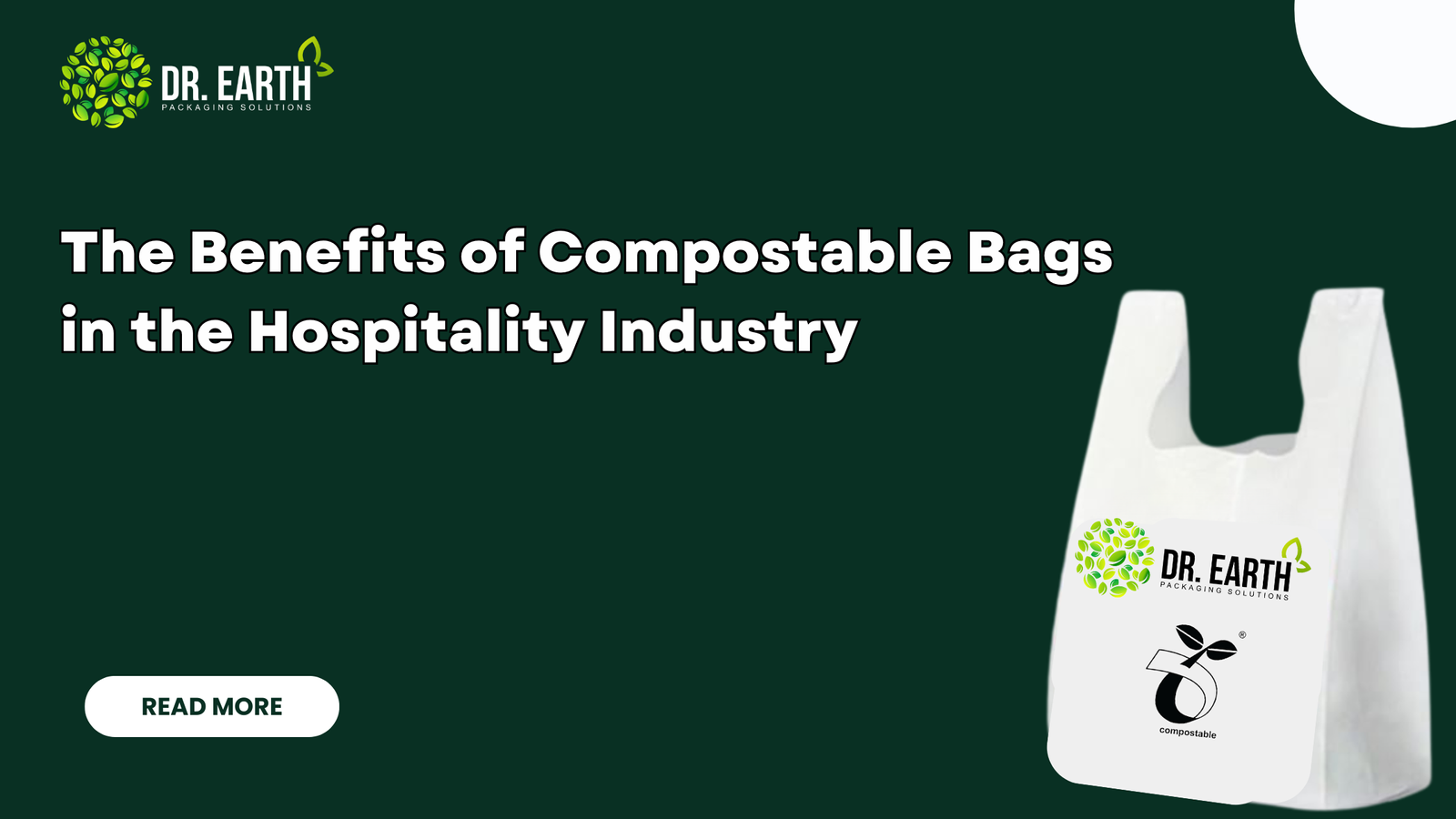
The increasing importance being given to sustainability is bringing about changes in the hospitality industry. With the awareness of environmental issues growing, guests expect business houses to be more environment-friendly. One of the most impactful changes hospitality businesses can make is to shift from traditional plastic bags to compostable bags.
The Environmental Impact of Plastic Bags in Hospitality
Over the years, plastic bags have been an integral aspect of the hospitality industry. However, the use of such bags has had some impacts on the environment. Of the 300 million tons of plastic that are create every year in the world, a considerable portion is flushed into the ocean and waste landfills.
Single-use plastics are found most common in the hospitality industry for packaging, food storage, and guest amenities. Unfortunately, these materials only take hundreds of years to decompose, thereby increasing the waste accumulation. Plastic wastes have severe environmental ramifications due to their harm to marine life and pollution in different ecosystems.
The production and burning of plastic bags also release greenhouse gas emissions that increase the problem of climate change. For hospitality businesses, plastic use does not only contribute to an environmental burden but also serves as a threat to the brand’s reputation within a progressively sustainable market.
Why switch to compostable Bags?
Compostable bags are an alternative to traditional plastics, both environmentally and operationally. With organic material, such as starches from corn, vegetable oils, or potato starch, the bags decompose in composting conditions.
Thus, it stops more waste from landfills and fosters the growth of sustainable methods for waste management. Therefore, adoption of compostable bags can be crucial to the hospitality industry on its route towards sustainability.
Enhancing Brand Image with Sustainable Practices
A strong brand image is the essence of the hospitality industry. Modern consumers increasingly look for businesses that demonstrate social responsibility and environmental stewardship. The adoption of compostable bags by hospitality businesses allows it to communicate effectively towards its sincerity of commitment towards sustainability and advancement over its competitors.
An environmentally caring brand attracts eco-friendly customers and increases the loyalty of existing customers.
Such positive word of mouth can eventually convert into increased customer satisfaction and recommendations or word of mouth. It further means hospitality brands get in this rapidly expanding pool since they associate themselves as a green enterprise.
Improving Guest Experience with Eco-Friendly Amenities
There’s no doubt that enhancing the guest experience is important. Adding compostable service offerings, such as trash bags, can significantly enhance their stay. The fact remains, today’s travelers often prefer businesses that have sustainable programs in place.
The hospitality businesses, in return, show their commitment to the eco-conscious guests by providing compostable bags for laundry services, take-out orders, or in-room amenities. A good example could be a hotel offering compostable bags to use for dirty laundry or food waste disposal. Restaurants can use compostable bags for take-out orders, so guests can also enjoy their meals without making contributions to plastic pollution.
Reducing Carbon Footprint and Supporting a Greener Supply Chain
Moving to compostable bags not only helps eliminate plastic waste but also enables hospitality companies to reduce their carbon footprint. Traditional plastic bags are derived from fossil fuels and thus contribute to greenhouse gases. In contrast, compostable bags are made from renewable resources.
These producers advance sustainable practices in all their activities—raw material sourcing, energy use, and waste management. Hospitality businesses can advance their sustainability efforts beyond their operations through partnering with such suppliers.
Cost Considerations of Compostable Bags
Other hospitality companies may be hesitant to utilize compostable bags out of fear of higher expenses. However, this is where the long-term advantages begin. Although the initial setup of compostable bags may cost more than the normal plastic bags, savings from the reduction in waste disposal fees and a higher level of satisfaction for customers may make the expenditure worthwhile.
Most importantly, there are strict regulations placed on the use of single-use plastics, which is currently being adopted in various municipalities that might be passed on to business outlets without adaptation. Hospitality businesses can avoid potential fines by transitioning into using compostable bags.
Marketing Sustainability Initiatives
The benefits to be obtained from the use of compostable bags would increase by active marketing of hospitality business sustainability initiatives. Increased awareness among guests and community is the result. A myriad of mediums would apply including social media, website and onsite signage to communicate the fact that using of the compostable bags is having positive impacts on the environment.
Telling stories related to sourcing compostable bags, the benefits of composting, and overall sustainable efforts by the business can strike a chord with environmentally conscious consumers. Having guests participate in sustainability initiatives by either enrolling them in the composting program or providing educational literature on waste reduction can improve the guest experience and strongly reinforce the brand’s eco-friendly image.
Compliance with Regulations and Certification Standards
As governments worldwide adapt strategies to curb plastic pollution, many start applying directives on the use of single-use plastics in the hospitality industry. Institutions can now conform to such regulations by adopting compostable bags to exhibit commitment to sustainability.
Several manufacturers of compostable bags want their products certified by prominent institutions that ensure the products are truly compostable and biodegradable. For example, a certification like ASTM D6400 or EN 13432 ensures consumers and businesses that the product they purchase will be accepted at specific levels for composting.
Using certified compostable bags from hospitality businesses can provide confidence in the products’ usage according to environmental rules and consumer expectations, making the hospitality business more dedicated to sustainability.
Challenges and Solutions in Adoption
Challenges and Solutions Adoption Even though compostable bags offer many advantages, their adoption in some hospitality businesses will come with several challenges. Some of the most common problems include that they are less tough compared to the traditional plastic bag.
However, this technology advanced into the creation of compostable bags that were no weaker and not less strong compared to the plastic version. Hospitality businesses can fill the gap by adopting better quality from reliable bag manufacturers while informing the employees on proper usage of compostable bags.
Another issue is that they require the existence of proper infrastructure to dispose of them. The bags should be disposed of in facilities that can treat compostable materials for their effectiveness. Hospitality businesses may engage local waste management services in making sure the guests can get proper ways of disposal.
The Future of Compostable Bags in Hospitality
As sustainability gains pace in the hospitality sector, it is bound to find more takers for compostable bags. They will worry about the footprint they leave behind in nature, and increased loyalty and support by customers can be anticipated as a result.
Some of the innovations in materials and production processes will be key drivers for compostable bags‘ growth.
Conclusion
Using compostable bags is one of the giant steps toward becoming sustainable in the hospitality sector. Such usage helps reduce plastic pollution while enhancing the brand image and improving guest experiences in general.
Hospitality businesses embracing compostable bags can provide a healthier planet and also cater to changing expectations of their guests. Without a shift in the course to sustainable ways of operations, the future of the hospitality industry is not sustainable. Innovative solutions and commitment to sustainability will pave the road to making an environmentally friendly future.
FAQs
Q- 1. What are compostable bags made of?
Ans- Normally, the compostable bags are constructed from organic materials consisting of starch from corn, vegetable oil, or potato. Such materials help to provide the bags with a tendency towards natural degradation in the context of composting.
Q- 2. How do compostable bags differ from biodegradable bags?
Ans- Whereas both bags biodegrade, the difference is in place from industrial composting conditions. While compostable bags degrade into non-toxic materials in a given timeframe, biodegradable bags may or may not decompose completely or leave some toxic residues in the environment .
Q- 3. Can compostable bags be used for all types of waste?
Ans- Compostable bags are mainly for organic waste and should only be used in environments that are truly equipped to compost. It is neither recyclable nor used to send off to the landfill.
4. How do compostable bags benefit the hospitality industry?
Ans- It reduces plastic waste; it enhances one’s brand image; improves guest experiences; and contributes to a healthier planet—all factors that today’s consumers care deeply about.
Q- 5. Are compostable bags more expensive than plastic bags?
Ans- While the starting price of compostable bags is higher than traditional plastic bags, the long-term benefits, including lower waste disposal costs and greater customer loyalty, make up for these expenses many times over.
Share:
Related Posts














